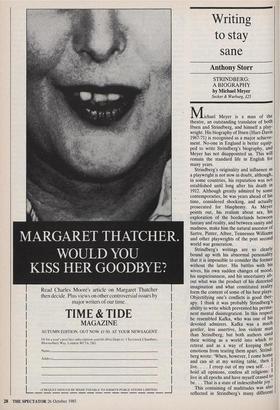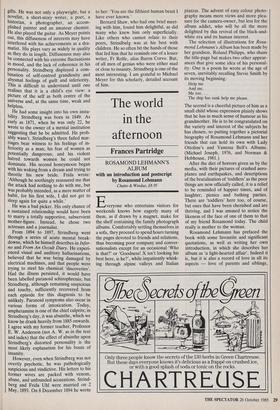Writing to stay sane
Anthony Storr
STRINDBERG: A BIOGRAPHY by Michael Meyer
Secker & Warburg, f25
Michael Meyer is a man of the theatre, an outstanding translator of both Ibsen and Strindberg, and himself a play- wright. His biography of Ibsen (Hart-Davis 1967-71) is recognised as a major achieve- ment. No-one in England is better equip- ped to write Strindberg's biography, and Meyer has not disappointed us. This will remain the standard life in English for many years.
Strindberg's originality and influence as a playwright is not now in doubt, although, in some countries, his reputation was not established until long after his death in 1912. Although greatly admired by some contemporaries, he was years ahead of his time, considered shocking, and actually prosecuted for blasphemy. As Meyer points out, his realism about sex, his exploration of the borderlands between fantasy and reality, and between sanity and madness, make him the natural ancestor of Sartre, Pinter, Albee, Tennessee Williams and other playwrights of the post second world war generation. Strindberg's writings are so clearly bound up with his abnormal personality that it is impossible to consider the former without the latter. His battles with his wives, his own sudden changes of mood, his suspiciousness, and his uncertainty ab- out what was the product of his distorted imagination and what constituted reality form the content of some of his best plays. Objectifying one's conflicts is good ther- apy. I think it was probably Strindberg's ability to write which prevented his perma- nent mental disintegration. In this respect he resembled Kafka, who was one of his devoted admirers. Kafka was a much gentler, less assertive, less violent man than Strindberg; but both authors used their writing as a world into which to retreat and as a way of keeping their emotions from tearing them apart. Strind- berg wrote: 'When, however, I come home and can sit at my writing table, then I live. . . . I creep out of my own self. . - I hold all opinions, confess all religions: I live in all epochs and have myself ceased to, be. . . That is a state of indescribable joy.' This containing of multitudes was also reflected in Strindberg's many different gifts. He was not only a playwright, but a novelist, a short-story writer, a poet, a historian, a photographer, an accom- plished painter and an amateur chemist. He also played the guitar. As Meyer points out, this diffuseness of interests may have interfered with his achievements as a dra- matist. His plays vary as widely in quality as they do in length. Diffuseness may also be connected with his extreme fluctuations in mood, and the lack of coherence in his personality. Strindberg displayed a com- bination of self-centred grandiosity and abysmal feelings of guilt and inferiority. This is difficult to understand until one realises that it is a child's eye view: a picture of the self as both centre of the universe and, at the same time, weak and helpless.
He had some insight into his own insta- bility. Strindberg was born in 1849. As early as 1871, when he was only 22, he wrote to the owner of a mental institution suggesting that he be admitted. He prob- ably wasn't. Strindberg's three failed mar- riages bear witness to his feelings of in- feriority as a man; his fear of women as potentially dangerous; and his violent hatred towards women he could not dominate. His second honeymoon began with his waking from a dream and trying to throttle his new bride. Frida wrote: `Although he soothingly reassured me that the attack had nothing to do with me, but was probably intended, as a mere matter of habit, for his first wife, I did not get to sleep again for quite a while.' He was a bad picker. His only chance of a sustained relationship would have been to marry a totally supportive, subservient mother-figure. Instead, he chose two actresses and a journalist.
From 1894 to 1897, Strindberg went through a series of acute mental break- downs, which he himself describes in Infer- no and From An Occult Diary. He experi- enced visual and auditory hallucinations, believed that he was being damaged by electrical machines, and that people were trying to steel his chemical 'discoveries'. Had the illness persisted, it would have been labelled paranoid schizophrenia; but Strindberg, although remaining suspicious and touchy, sufficiently recovered from each episode for this diagnosis to be unlikely. Paranoid symptoms also occur in various forms of intoxication. Today, amphetamine is one of the chief culprits; in Strindberg's day, it was absinthe, which we know he drank heavily from 1885 onwards. I agree with my former teacher, Professor E. W. Anderson (not A. W. as in the text and index) that the effect of absinthe upon Strindberg's distorted personality is the most likely explanation for his bouts of insanity. However, even when Strindberg was not overtly psychotic, he was pathologically suspicious and vindictive. His letters to his former wives are packed with venom, abuse, and unfounded accusations. Strind- berg and Frida Uhl were married on 2 May, 1893. On 8 December 1894 he wrote to her: 'You are the filthiest human beast I have ever known.'
Bernard Shaw, who had one brief meet- ing with him, found him delightful, as did many who knew him only superficially. Like others who cannot relate to their peers, Strindbeig was at his best with children. He so often bit the hands of those that fed him that he reminds one of a lesser writer, Fr Rolfe, alias Baron Corvo. But, of all men of genius who were either mad or close to insanity, Strindberg is one of the most interesting. I am grateful to Michael Meyer for this scholarly, detailed account of him.



























































 Previous page
Previous page